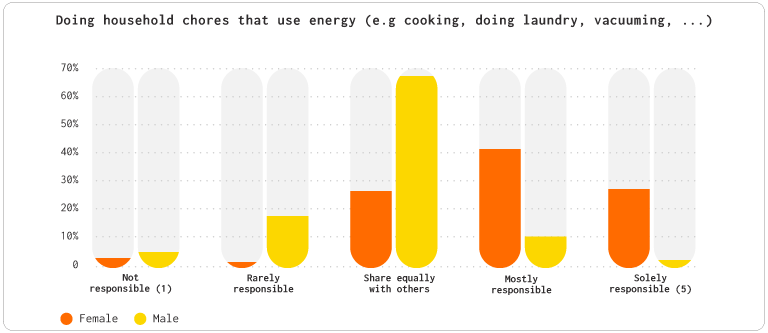Energy is not only the fuel that drives our economy; it also lights our homes and powers our daily lives. However, there is a persistent imbalance in the distribution of responsibilities when it comes to domestic work. Despite women’s increased participation in the workforce, they still perform more unpaid domestic work than men. According to the OECD’s 2023 statistics, women spend an average of 4.4 hours per day on domestic work, compared with 2.3 hours for men. These inequalities are at the heart of our Citizen Action Labs (CALs) and were explored in the CAL surveys.
Our goal was to identify inequalities in energy-related tasks, from choosing energy providers and contracts to paying bills, buying appliances, and using them. In our survey, 171 people from nine CALs in six countries shared their experiences, with 67% of respondents being female. The survey results show that 66% of men say they are mostly or solely responsible for choosing their energy supplier, compared to 42% of women. Interestingly, when we examine the extremes, women tend to cluster in the categories of either sole responsibility or no involvement in this task. Importantly, this pattern persists even when we exclude single households from the analysis
A parallel pattern emerges for paying utility bills, with 60% of men claiming primary responsibility compared to 49% of women. About 30% of both genders report that this task is shared equally among family members.
Digging deeper, we found differences in decisions about purchasing appliances and sharing household chores. While both genders see appliance purchases as primarily a shared decision (40% of the time), the division of time for household chores is markedly gendered.
In family households, 68% of women say they are mainly or exclusively responsible for cooking, laundry or vacuuming. In contrast, the figure for men is much lower (12%). Furthermore, while 66% of men believe that these tasks are shared equally, only 27% of women agree. This difference in perceived gender equality in sharing household tasks suggests that men may be unaware of the disproportionate amount of time women spend on household tasks.

This stark contrast in perceived gender equality in household tasks underscores the need for awareness and change. Exploring the intersection of energy and gender equality and addressing imbalances is not only a matter of fairness; it’s a step toward a more sustainable and equitable future for all.
Author: Benjamin Kirchler (Energieinstitut at the Johannes Kepler University Linz- EI-JKU)
Benjamin Kirchler
Energieinstitut at the Johannes Kepler University Linz- EI-JKU